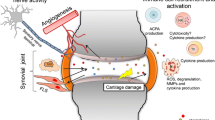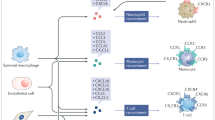Abstract
Rheumatoid arthritis (RA) is a chronic, multisystem autoimmune disease characterized by persistent synovitis. Since chemotactic cytokines (chemokines) may play critical roles in the recruitment of leukocytes in RA, analyses of chemokines and their receptors should provide insight into events in synovial inflammation in RA. The production of chemokines is regulated by cytokines such as tumor necrosis factor (TNF)-α produced in the inflamed joint, suggesting that the efficacy of anti-TNF-α therapy is mediated at least partly by the reduction of chemokine production. Chemokines have a role in joint inflammation not only by inducing leukocyte chemotaxis, but also by activating immune cells and angiogenesis. The pathogenesis of RA has been shown to be mediated by Th1-type T cells, because Th1-related chemokine receptors are preferentially expressed on cells in synovial fluid and synovial tissue. Accordingly, antichemokine therapy may be important as a possible new approach to therapeutic intervention in RA.
Similar content being viewed by others
Author information
Authors and Affiliations
About this article
Cite this article
Tani, K., Shimizu, T., Motoki, Y. et al. Chemokines in synovial inflammation in rheumatoid arthritis: basic and clinical aspects. Mod Rheumatol 12, 93–99 (2002). https://doi.org/10.1007/s101650200017
Issue Date:
DOI: https://doi.org/10.1007/s101650200017




